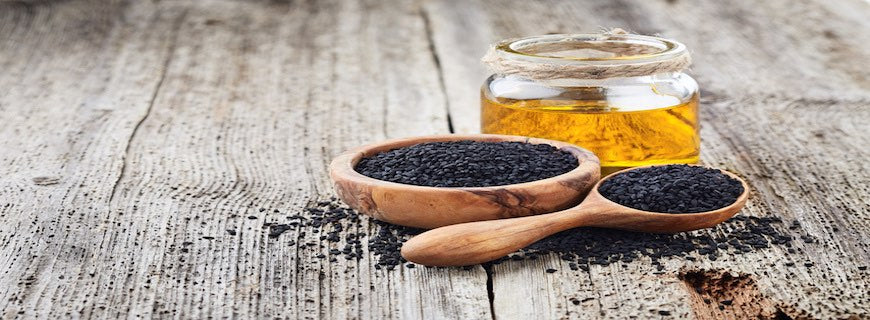For many, black seed oil remains an untapped natural resource, a highly pure, antioxidant-rich remedy. For others, it is an integral part of both their wellness plan and their culture.
Yes, black seed oil (or black cumin seed oil) has been traditionally and extensively used for generations, particularly throughout Asia – no surprise given Nigella sativa, the flowering plant which provides the oil, is indigenous to South Asia.
Employed both topically (rubbed onto the skin) and internally for thousands of years, and recommended for a myriad of ailments, black seed oil was said to have been described by the Prophet Muhammad as “a cure for every disease except death.”
In this blog post, we investigate the various uses of black seed oil for herpes, acne, and hair loss, as the title suggests, but also for cholesterol; blood sugar reduction; hepatitis C; rheumatoid arthritis; weight loss; even cancer.
Sceptical? That's quite all right: there are many different perspectives and a mountain of scientific evidence to review. Read on to learn more about the therapeutic benefits of black seed oil.
What is Black Seed Oil?
Black cumin, black seed, black caraway, kalonji – they all refer to the tiny seedlings of the aforementioned Nigella sativa. Considered an important remedy in folk medicine throughout Middle Eastern, Asian and even European culture, the seeds have also been used in cooking, sprinkled atop curries and flatbread to add flavour.
A rich source of vitamins, minerals, essential oils, alkaloids and unsaturated fatty acids, the latter of which constitutes approximately 30% of the seeds, the product of Nigella sativa is highly nutritious.
Indeed, the high amounts of copper, zinc and linoleic acid are just the tip of the iceberg: because black seed is a generous source of thymoquinone (TQ), a powerful antioxidant, anti-carcinogenic, anti-mutagenic, anti-epileptic and anti-inflammatory compound.
It is thymoquinone which is most often cited as being the primary pharmacological agent within black seed.
Black Seed Oil for Skin Complaints and Acne
Many cosmeceutical applications have been suggested for black seed oil, particularly due to its essential oil content. After all, black seed contains more than just thymoquinone; it’s also a source of thymohydroquinone, dithymoquinone, thymol, nigellicine, nigellimine, nigellicine, carvacrol, nigellidine and alpha-hederin.
Used for centuries to treat dermatological disorders, acne vulgaris, burns and other types of skin irritation, pigmentation and inflammation, black seed oil’s usefulness in this regard is probably due to its anti-microbial and anti-viral properties.
With regards to acne specifically, 20% black seed oil extract when employed in a lotion formula was shown to demonstrate better efficacy than benzoyl peroxide lotion 5%, a typical treatment for acne and pimples.
In another clinical study from 2010, black seed oil lotion 10% ‘significantly reduced mean lesion count of papules and pustules’ after two months of administration. In the test group, the response to treatment was described as good in 58% of subjects (versus 8% in control group) and moderate in 35% (vs 34%).
If using black seed oil topically, take care to keep out of the eyes, nostrils and other sensitive parts of the body.
Black Seed Oil for Rheumatoid Arthritis
According to the results of a 2016 study, black seed oil may prove useful as part of the treatment for rheumatoid arthritis.
The trial looked at 43 females with mild-to-moderate rheumatoid arthritis, and divided them into two groups, with one taking black seed oil capsules daily and the other consuming a placebo. The study lasted one month.
In the end, the black seed oil treatment group experienced a notable reduction in arthritis symptoms, as determined by the DAS-28 rating scale; they also enjoyed reduced blood levels of inflammatory markers and the number of swollen joints was similarly decreased.
Although unlikely to be used as a single therapy, black seed oil might be employed in conjunction with a number of other treatments for rheumatoid arthritis such as magnesium oil and turmeric.
Related: Natural Remedies for Arthritis Pain: Herbs, Supplements & More
Black Seed Oil for Cholesterol
N. sativa powder has been evaluated for its effect on plasma lipid profiles in humans. In a 2009 study, the results of which were later published in the World Applied Sciences Journal, intake of the powder among hypercholesterolemia patients for a period of two months was shown to reduce total cholesterol and triglycerides ‘to a highly significant extent’. The patients took 1g before breakfast every day for eight weeks.
In a separate study, black seed oil was shown to lower cholesterol in adults with levels above 200 mg/dl: total cholesterol fell by an average of 4.78%, LDL (‘bad’) cholesterol plummeted by 7.6% and overall triglycerides dropped by 16.65%. The dose was double that of the first trial, 2g daily.
Black Seed Oil and Hair Loss
Just as it has been said to soften skin, black cumin oil is apparently great for hydrating hair follicles, moisturising, strengthening and promoting hair growth.
It may even help to combat greying hair, specifically by halting the depletion of pigment cells in follicles.
Several cosmetic products with excellent reviews on Amazon count black cumin oil as one of their key ingredients. Black Seed Deep Conditioning Hair Mask, manufactured by Vatika Naturals, is just one of them.
According to one verified customer review, “I was losing hair like crazy and I didn’t know what else to try. This little black container proved to be a miracle. I don’t know how others react to it, but in my case it helped tremendously with my hair loss, it makes it shinier and much more manageable. Sometimes I don’t even use shampoo or conditioner, just wet my hair, put this on as per the instructions and rinse it.”
Improved shine, texture and volume? It sounds too good to be true. But black seed oil’s anti-fungal and anti-bacterial properties suggest it could do more than that, helping to combat oiliness, dandruff and scalp irritation.
To trial black seed oil for hair loss, try massaging it onto your scalp, working it from the roots to the tips, then leaving for 30-60 minutes before washing off with regular, environmentally-friendly shampoo.
It can also be used in conjunction with olive oil and coconut oil: just add 1 tbsp of either to 1 tbsp of black seed oil.
Black Seed Oil for Herpes
According to a 2016 Saudi Arabian study, cumin seed methanolic extract at 4 mcg/ml provided 61% inhibition of plaque of herpes simplex virus 1 (HSV-1) and 49% inhibition of plaque of herpes simplex virus 2 (HSV-2).
It should be noted that cumin seed (cuminum cyminum) differs slightly from black cumin seed, although they share the distinction of being widely used in the traditional and Ayurvedic system of medicine. Instead of thymoquinone, the main constituent of cumin seed is cuminaldehyde.
Black seed oil, for its part, may help those with herpes by supporting the immune system. However, there is no evidence to suggest that it will get rid of the virus.
Black Seed Oil for Hepatitis C
A study conducted in 2013, which sought to investigate the effect of N. sativa on patients with the hepatitis C virus (HCV), yielded impressive results.
The subjects were given 450mg of black seed oil, in the form of capsules, every day for 12 weeks, after which a reduction in overall viral count was noted. Antioxidant activity also increased, highlighting a reduction in the hemolysis of red blood cells and platelet.
Can Black Seed Oil Help Cancer Sufferers?
There is some evidence to suggest a therapeutic benefit from black seed, and in particular from its main constituent thymoquinone, for sufferers of cancer.
In a 2014 review paper (1) published in the journal Evidence-based Complementary and Alternative Medicine, the potential of black seed oil for the prevention of cancer ‘through the activation or inactivation of molecular cell signalling pathways’ was explored.
The authors went on to note TQ’s ‘critical role in controlling cancer via the activation of tumor suppressor gene, phase II gene/enzymes, and peroxisome proliferator-activated receptors (PPARs)’ and cited a 2011 study (2)which ‘proved that TQ showed anticancer effects and regulated apoptosis in doxorubicin-resistant human breast cancer cells (MCF-7/DOX cells).’
As for specific cancers with which black seed is associated, the investigators noted that thymoquinone ‘shows therapeutic roles in diseases control including cancers such as pancreatic, osteosarcoma, bladder, breast, colon, skin and lung and other diseases.’
Of course, much more investigation is needed: an insufficient number of clinical trials have been performed on cancer patients, though an experimental study of an animal model indicated that black seed use in disease management came with ‘no toxic effect.’
Black Seed Oil & Blood Sugar Reduction
Black seed oil has been shown to be beneficial for diabetic symptoms including high blood sugar and insulin resistance. A 2011 review paper summarises the reasons for this: ‘[N. sativa] reduces appetite, glucose absorption in intestine, hepatic gluconeogenesis, blood glucose level, cholesterol, triglycerides, body weight and simulates glucose induced secretion of insulin from beta-cells in pancreas.’
Furthermore, the anti-diabetic activity of black seed oil was confirmed by a study on 60 patients with insulin resistance, wherein consuming 5ml daily resulted in improved fasting blood glucose levels. It should be noted, however, that the oil was combined with glucose and lipid-lowering medication.
Related: 7 Tips for Naturally Controlling Your Blood Sugar Levels
Black Seed Oil for Weight Loss
While the evidence for weight loss is still limited, that’s not to say it mightn’t be useful. There are a few modest-sized studies which found better weight loss results when black seed oil was used, and these involved both men and women. One study also showed that black seed oil suppressed appetite.
The bottom line is that more studies are needed; and as we all know, weight loss is best achieved through a protocol of regular exercise, sensible dieting and calorie control. There is no magic pill.
Conclusion
By no means does this article cover all the benefits, or potential benefits, of black seed oil. Studies – some on rats, others on humans – have shown the potential of N. sativa to improve liver and kidney function, improve sperm count, enhance memory, slow the progression of Alzheimer’s, relieve indigestion, reduce breast pain, combat anxiety and improve gut motility.
One thing’s for sure, with so many trials having been conducted on black seed oil, and such a long history of use in traditional cultures, many people have experienced the benefit of this miracle compound.
Black seed oil can be taken right off the spoon, incorporated in a salad dressing or dip, added to a smoothie or utilised on the skin. It can also be used a soothing head or chest rub.
Water for Health Ltd began trading in 2007 with the goal of positively affecting the lives of many. We still retain that mission because we believe that proper hydration and nutrition can make a massive difference to people’s health and quality of life. Click here to find out more.
Article updated 27/2/25
Sources
1. Rahmani AH, Alzohairy MA, Khan MA, Aly SM. Therapeutic Implications of Black Seed and Its Constituent Thymoquinone in the Prevention of Cancer through Inactivation and Activation of Molecular Pathways. Evid Based Complement Alternat Med. 2014;2014:724658. doi: 10.1155/2014/724658. Epub 2014 May 18. PMID: 24959190; PMCID: PMC4052177. https://pmc.ncbi.nlm.nih.gov/articles/PMC4052177/
2. Arafa el-SA, Zhu Q, Shah ZI, Wani G, Barakat BM, Racoma I, El-Mahdy MA, Wani AA. Thymoquinone up-regulates PTEN expression and induces apoptosis in doxorubicin-resistant human breast cancer cells. Mutat Res. 2011 Jan 10;706(1-2):28-35. doi: 10.1016/j.mrfmmm.2010.10.007. Epub 2010 Oct 30. PMID: 21040738; PMCID: PMC3037029. https://pmc.ncbi.nlm.nih.gov/articles/PMC3037029/




























Leave a comment